This stomach cancer, or gastric cancer overview and associated articles will give you help you increase your personal odds of beating stomach cancer - the symptoms, the diagnosis and all the latest options on treatments and therapies - from cancer drugs and chemotherapy to surgery, radiotherapy and complementary therapies; including all the very latest alternative and new therapies and information. We will even cover the causes.
This article has been compiled from worldwide research and expert sources*
Read the whole of this article on stomach cancer or simply click on the sections of most interest.
|
The CANCERactive Difference: Intelligent Information. Independent Voice. On this web site you will find more information about more treatment options (Complementary and Alternative, not just Orthodox), and on more possible contributory factors to the development and maintenance of your cancer, than on any other UK cancer web site. Some experts believe that approaching your cancer in this total way can increase an individuals chances of survival by as much as 60 per cent.
The very latest research evidence from all over the world in our news section Cancer Watch supports all this.
We can do this because we are not hide-bound by vested interests, and so we can always put people first. We are not influenced by companies who seek to make financial gains from patients, we have no trustees working for, or sponsored directly or indirectly by such companies, our directors take no remuneration at all. This is our true independence, from which you benefit directly.
But this comes at a price we rely on you, and people like you to support our work. 47,703 people visited our site in March 2007, viewing 11 pages on average. Every month we add 20 new pages to this site. If you feel an independent voice is essential in cancer, please, please help by making a donation. Every little helps.

|
Introduction
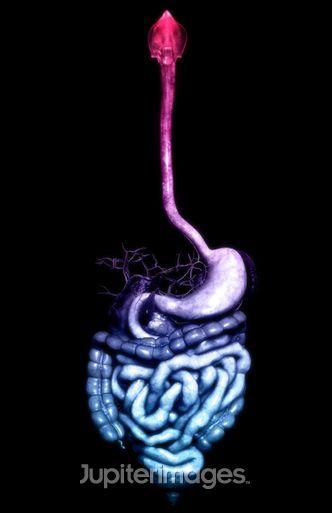 I was speaking a few years ago in Adelaide to an audience of about 3,000 people, and in the evening there was a Gala Dinner. As is so often the case, in the middle of dinner, I was approached by someone who wanted help with their cancer. In this case it was a bright South African girl and her husband, both in their early thirties, both with good degrees. She started to tell me how she had had two years of intermittent stomach pains and had been diagnosed with a stomach ulcer. Drugs and the usual bottle of antacid were prescribed. However, two years later the stomach cramps became ever worse and she was diagnosed with stomach cancer.
I was speaking a few years ago in Adelaide to an audience of about 3,000 people, and in the evening there was a Gala Dinner. As is so often the case, in the middle of dinner, I was approached by someone who wanted help with their cancer. In this case it was a bright South African girl and her husband, both in their early thirties, both with good degrees. She started to tell me how she had had two years of intermittent stomach pains and had been diagnosed with a stomach ulcer. Drugs and the usual bottle of antacid were prescribed. However, two years later the stomach cramps became ever worse and she was diagnosed with stomach cancer.
Eager to return to my now cold meal, I said something like, ’Look. Just go along to your Doctor and tell him to check you for Helicobacter Pylori it causes both stomach ulcers and stomach cancer. I’m sure they’ve mentioned it to you?’
’No’, came the reply.
’Well, he will have a cocktail of three drugs you can take, or you can use the herb Goldenseal and Bismuth’ (It has been known for years to work with cattle). ’And beware the antacid - acid kills the bacterium; it’s your body trying to eliminate the bacterium and it is hiding against the stomach lining in the mucus’.
To all of this she replied, ’I can’t do any of this. My doctor removed my stomach. I only came to ask you what vitamins I could now take!!’
 Want to receive the very latest, hot information on this subject? Click here
Want to receive the very latest, hot information on this subject? Click here
Now you may wonder if I have any honest knowledge to be saying all this? And the answer is ’Most Definitely’. You see I had Helicobacter Pylori when I was working in advertising. I had bad stomach pains a stabbing high in my stomach - and my Doctor sent me for every test known to Harley Street. But all the orthodox medical comment was simply, ’Well you’re in advertising - that’s why you get this stabbing pain in the stomach’. (I used to reply that in advertising you got a stabbing pain in the back).
No one ever identified my illness just telling me that I had a very acidic stomach and recommending drugs to turn off the acid. It was only 6 years later, when a friend on a golf course suggested I might have a parasite; then a subsequent VEGA check confirmed Helicobacter Pylori. The check up and a course of Neways Parafree, some Wormwood, Pepsodol and a pot of High Street Goldenseal cost me about $200 US. Or about a twentieth of the cost of Harley Street’s finest.
return to the top
Stomach, or Gastric, Cancer Inflammation and Irritation
 NB: Although we always try to write in easy-to-understand words, you may find that some web sites, information leaflets, Doctors and Nurses use words that are not as easy to understand. For that reason we have compiled a list of all the technical words they commonly use called DOCTORSPEAK, the list turns it all into simple, easy to understand English. You can find this list of words by clicking here.
NB: Although we always try to write in easy-to-understand words, you may find that some web sites, information leaflets, Doctors and Nurses use words that are not as easy to understand. For that reason we have compiled a list of all the technical words they commonly use called DOCTORSPEAK, the list turns it all into simple, easy to understand English. You can find this list of words by clicking here.
return to the top
Types of Stomach cancer
Of around 10,000 cases of stomach cancer, the majority are cancers of the glandular cells of the stomach lining. This is called an adenocarcinoma.
Very rarely the tumour might start in the muscle tissue a soft tissue sarcoma.
You may also have a cancer of the lymphatic system, but in the stomach called a MALT lymphoma.
return to the top
Warning signs
You may experience the following early warning symptoms:
- Bloating after eating
- Indigestion or stomach discomfort.
- Feeling slightly sick
- Loss of appetite.
- Heartburn.
As the disease progresses, so do the signs:
- Stomach pain.
- Trouble swallowing
- Actually being sick
- Weight loss for no known reason.
- Blood in stools
return to the top
Possible Contributory factors
Smoking seems to increase the risk of this cancer, as does the statistic of being male and being older. Hereditary factors make some people more likely to develop polyps in their stomach, certain disorders like pernicious anaemia, gastritis and other irritable stomach problems are blamed, as is Barrett’s oesophagus, a condition where abnormal, non-cancerous cells develop on the joining area between stomach and oesophagus. Eventually these can become cancerous. The real issue is what makes these problems more acute? What irritates the situation further, or are they enough on their own to turn into cancer?
In icon Cancer Watch pages over the last 10 years we have covered a number of worldwide research studies on possible causes/contributory factors:
1) Your stomach, as with your intestines, holds the majority of your Microbiome, a finely balanced group of bacteria that control your good health. Roughly 800 different strains are known to live inside your body; about 400 have been identified; there are approximately 100 clinical trials and about 4000 research studies in the last 5 years on them. You 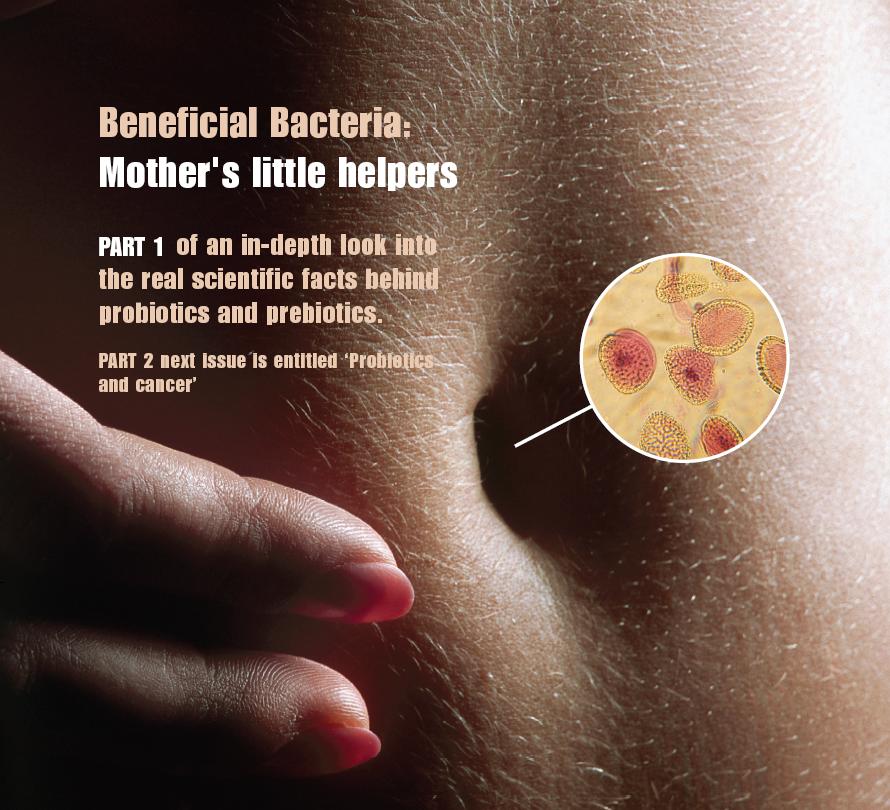 should read our two articles Beneficial Bacteria and Beneficial Bacteria and Colorectal cancer to better understand these crucial contributors to your health they develop your immune system; they help digest your food for you; they actually help synthesise important vitamins and fatty acids; they help eliminate unwanted toxins; and importantly, they protect you from microbes, nasty bacteria and other unwanted invaders.
should read our two articles Beneficial Bacteria and Beneficial Bacteria and Colorectal cancer to better understand these crucial contributors to your health they develop your immune system; they help digest your food for you; they actually help synthesise important vitamins and fatty acids; they help eliminate unwanted toxins; and importantly, they protect you from microbes, nasty bacteria and other unwanted invaders.
Sadly, we treat them very badly.
-
We eat carbohydrates mixed up with protein on the same plate and in the same mouthful. But carbohydrate mixes with an enzyme called ptyalin in your mouth and needs an alkaline environment for good digestion. Protein mixes with the enzyme pepsin in your stomach and this demands acid to work properly. Result: An insipid mixture in the stomach. While carbohydrates take about an hour to pass through if eaten on their own, and protein takes about 90 minutes, the combination of the two might not fully leave the stomach for eight hours!
-
As we age we, anyway, make less stomach acid, weakening our digestion. Stress worsens this as does a variety of foods from nitrites and nitrates (eg. in pesticides, and dried meats), to excess salt (in processed and packaged foods) to the ubiquitous antacids for indigestion and heartburn. What no one ever seems to do is ask, ’Why do I have the acid in the first place?’
-
Then, we consume all manner of friendly bacteria killers from drugs like antibiotics and steroids, to chlorinated water and antibiotics in our chickens.
-
And, unlike 199 years ago when we ate more fermented foods and lived in primarily rural environments, we do not add new top-up levels each day. Worse, our Governments and health authorities actually prevent us for example, by banning raw milk, and pasteurisation, and irradiation of foods.
Acid levels and lactobacillus acidophilus are essential for keeping dangerous bacteria like helicobacter pylori in check.
2) For about 10 years it has been known that Helicobacter Pylori contributes to stomach ulcers. And for about 5 years the same has been true about stomach cancer. The researchers do get a little confused sometimes between cause and effect.
For example: There have been research reports saying that people with stomach cancer have low vitamin B-12 levels, or low folic acid levels and well they might.
A lack of beneficial bacteria in the gut will reduce production levels of certain B vitamins
Other reports (For example from the European Cancer Centre IARC in Lyon) talk about nitrates, nitrites and nitrosamines being causal:
For example, this report: Scientists from 19 countries, at the International Agency for Research on Cancer in Lyon (IARC) have concluded that high nitrite levels (especially in conjunction with low vitamin C levels) are linked to carcinogenicity. Links with stomach cancer, oesophageal cancer and brain tumours were especially noted. The working group were especially concerned with the run-off of fertilisers into surface and well water. Nitrites and nitrates may have a direct cancer effect or promote the by-products of cyanobacteria in the soil and water. By-products such as microcystins and nodularins are cyclic peptides and are toxins produced when the bacteria die. These toxins accumulate in fish and shellfish, for example. Significant evidence also linking these toxins to liver cancer was found.
 Dried and smoked meats and fish, including sausages and pates have all been linked to stomach cancer
Dried and smoked meats and fish, including sausages and pates have all been linked to stomach cancer
True, nitrites and nitrates come from pesticides but they are also present in and these have been linked many times to stomach cancer. And so have nitrosamines commonly formed by burning meat on the barbeque, they are now even found in personal toiletry products.
But - Beneficial Bacteria have been shown in clinical trials to neutralise these toxic chemicals in the gut.
3) Too much salt in the diet (the Japanese have linked a doubling of intake with a doubling of risk) and the consumption of large amounts of pickled products (again Japanese research well they do have high levels of stomach cancer!) are also linked. But salt and vinegar will greatly alter the stomach and intestinal pH levels, and this will favour some bacteria, whilst reducing the effectiveness of the normal beneficial ones.
4) Some researchers have linked stomach and colorectal cancers to localised oestrogen levels.  There are a whole set of reasons that you may have too much oestrogen in your body from being overweight, to taking hormone pills like HRT, to consuming fatty meat (the fat can hold pesticides and chemicals that can mimic the action of oestrogen in the body; and the animals own oestrogens too), or using a whole host of household chemicals and toiletry products that contain xeno-oestrogens or chemicals that once inside the body can mimic oestrogen). You should read the Four Pillars of cancer, especially pillar 2
There are a whole set of reasons that you may have too much oestrogen in your body from being overweight, to taking hormone pills like HRT, to consuming fatty meat (the fat can hold pesticides and chemicals that can mimic the action of oestrogen in the body; and the animals own oestrogens too), or using a whole host of household chemicals and toiletry products that contain xeno-oestrogens or chemicals that once inside the body can mimic oestrogen). You should read the Four Pillars of cancer, especially pillar 2
5) And then came Wang: Professor Wang of British Columbia and his team in November 2004. They issued a research study under the heading of Revolutionary new thinking saying that cancer text books needed to be torn up for they had discovered how cancers are really formed! In their research they had looked at problems in the stomach lining. When the stomach lining becomes irritated and damaged, stem cells from the bone marrow rush round to repair it. Stem cells are the original foetal cells they are blank cells and can develop into any cell you need from retinal eye cells to liver cells to stomach wall cells. However Wang found that in the presence of too much oestrogen, the stem cells do not turn into (Official word: Differentiate) new stomach lining cells but stay as rapidly dividing stem cells, and thus a rapidly dividing colony of cancer cells develops. (See Dr Gonzalez for more on this). Now, I’m sure Wang is right but it is just one of the ways a cancer can form, not the only way as he seemed to be implying.
But In Clinical Trials Beneficial Bacteria have been shown to neutralise Oestrogen and help eliminate it from the body.
return to the top
Probable Scenario
Helicobacter Pylori hides from your stomach acid by diving into the mucosal membrane and taking up a position next to the stomach lining where it eats and thrives and emits waste toxins. Your body is not impressed and so it sends out immune cells to attack and digest this foreigner. But theres a slight problem. The forces of light and the forces of evil are on opposite sides of the stomach lining. The white cells cant get at the Helicobacter Pylori cells. Much irritation then occurs. Result: Stomach Ulcer.
The stem cells collect round the mess to try to form new stomach lining cells but the invader is not going away, continuing the irritation. Under Wang’s scenario, if there is too much oestrogen around the collection of impotent stem cells then just colonise and carry on dividing rapidly. Result: Cancer Tumour
return to the top
What can you do?
By this point you should be reasonably clear: Much, if not all, of stomach cancer is caused by too much microbial/foreign/harmful bacteria presence and too little good/ beneficial bacteria presence. The issue is simple. Is this scenario irreversible?
Before scalpels are drawn, there are definitely things you might try:
1)  A VEGA check will inexpensively tell you whether Helicobacter Pylori is present. Your Doctor can also do a stool test but he has to tell the lab technicians exactly what to look for. There are other parasites that can infect the stomach and bowels. (e.g. Shegela from South East Asia and increasingly available with exotic and imported foods. No holiday to foreign parts necessary!). A VEGA check will tell you if anything is unusual, and even what food allergies you have too.
A VEGA check will inexpensively tell you whether Helicobacter Pylori is present. Your Doctor can also do a stool test but he has to tell the lab technicians exactly what to look for. There are other parasites that can infect the stomach and bowels. (e.g. Shegela from South East Asia and increasingly available with exotic and imported foods. No holiday to foreign parts necessary!). A VEGA check will tell you if anything is unusual, and even what food allergies you have too.
2) If anything abnormal is detected your doctor will have the necessary cocktails of drugs. Those preferring to treat themselves should consider the following Package:
- Sip Aloe Vera first thing in the morning and last thing at night it contains about half a dozen anti-inflammatories to help calm things down
- Take Goldenseal best to get a Naturopath to prescribe it but a double dose from a high street bottle would be a reasonable place to start. Bismuth is also useful you might try the proprietary Bisodol.
- Take Garlic supplement, first thing in the morning and last thing at night with cold water. Chop fresh garlic on your salads
- Supplement with a multi-strain probiotic For example Neways Advanced Probiotic and/or Prebiota 7 from your High Street. You need 6 or more strains and definitely L. Acidophilus. 16 billion a day.
- For added Insurance, take a two month course of Neways Parafree, and add two weeks of Wormwood. The herbs oregano and Pau Darco plus Caprylic Acid (coconut) can also kill yeasts and microbes.
- Plan a careful Diet and eating programme using the above points and looking at our Diet Section under Complementary and Alternative Treatment Therapies
- Cut excess Oestrogen: You could try reading our book, Oestrogen the killer in our midst.
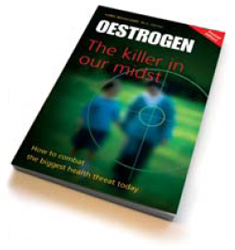
return to the top
Diagnosis
Your oncologist will examine you by one or more of several means:
- An Endoscope where a long tube is pushed down through your mouth into your stomach dont worry, you will be sedated. It may just use a camera connected to a TV monitor, and/or it may use an Ultrasound probe to produce a scan.
- The doctor (especially in the USA) may take blood and stool samples looking for blood in the stools and any warning factors in either.
- A barium meal test may be used. You drink a chalky drink containing barium, and lie down while your stomach is X-rayed. Again the doctor can see the state of your stomach on a TV monitor.
- Ultrasound scan where a gel is rubbed on your stomach and a metal device (why is it always so cold?) moved over your stomach. The sound frequency gives images of your stomach on a screen.
- A CT scan. You will be given an injection probably containing iodine to better show up the hot spots in your stomach. You lie on your back and go into a chamber. The scan takes about 10 minutes and involves multi-dimensional X-rays giving a 3D picture to pin point tumours. You may become very hot and you should tell someone immediately. You should also discuss whether you have any allergies (especially asthma or to iodine) with your doctor. (NB: Too many CT scans should be avoided where possible. Research from Columbia University {icon Vol 3 Issue 4}calculated that the radiation produced from an annual CT scan risks a 1 in 50 chance of death. ’The risks of a full body scan are reasonably well quantified’, says Dr David Brenner)
In all cases you probably shouldnt eat or drink after midnight the previous day.
return to the top
Grade and stage
The Grading of your cancer tells you how aggressive it is 1 is slow growing, and 4 is fastest.
The stomach also contains lymph nodes Stage 1 means that only your stomach wall is affected, Stages 2 and 3 mean that lymph nodes are affected too, and Stage 4 means that there is spread outside of the stomach to other organs.
 Click here and read our article "What is Cancer"
Click here and read our article "What is Cancer"
return to the top
Treatment
Surgery: Where the cancer is at stage 1 the doctors are most likely to use surgery to cure the cancer as several other UK web sites put it. Of course surgery will not cure the problem, and you would be well advised to look into the Helicobacter plan above and to change your normal behaviour on diet, toxins, beneficial bacteria and oestrogen.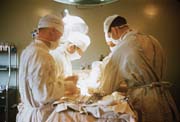
Surgery may:
- Involve just a small incision (a Laparoscopy) to push a camera on a tube inside your stomach to understand exactly where the cancer is and the scope needed for the subsequent surgery
- Remove a part of the stomach (Partial Gastrectomy)
- Remove all of the stomach (Total Gastrectomy). This may even include areas of the oesophagus, and/or intestine, and/or the spleen depending upon level of infection.
- Remove some or all of the lymph nodes
- Effect a bypass from the gullet straight to the intestine
In the USA the practice of Endoscopic Laser surgery is gaining ground as it is cleaner, can be more limited and involves less bleeding.
If you have had a stomach operation and some or all of your stomach has been removed it is imperative you obtain professional dietary advice. Frankly it is simply not possible to just remove the stomach and expect the intestines to replace the work it used to do (especially on protein digestion) as some cancer web sites misleadingly tell you. There are dieticians at Hospitals, but personally I would go to see an expert Naturopath or Nutritionist pretty quickly. Doctors may also want to give you three monthly B-12 injections no harm in this. But it shows they don’t understand the role of Beneficial Bacteria in a healthy gut, nor are up-to-speed on all the latest research.
Radiotherapy: It is very rare for radiotherapy to be used in the treatment of stomach cancer because of collateral damage to nearby organs like the liver. It is sometimes used to stop bleeding, reduce pain or to shrink a tumour where a blockage to the stomach is occurring.
Chemotherapy: Chemotherapy is used only where the stomach cancer is in a location that makes it difficult to operate on; or where the cancer is stage 3 or 4 and has started to spread beyond the stomach and lymph nodes.
The use of chemotherapy per se after surgery for stomach cancer is rare because the research does not indicate any long-term survival increase or benefit.
The most common drugs used are Cisplatin, Taxol, Epirubicin, Fluorouracil, Lomustine, Mitomycin and Methotrexate. According to a randomised trial reported in the Lancet Oncology Vol 7 July 2006 capecitabine could replace fluorouracil, and oxaliplatin could replace cisplatin. For information on your Cancer Drugs and chemotherapy click here.
return to the top
Other
1) Biological Immune Therapies: This is a new area of development where, for example, monoclonal antibodies or even vaccines are prepared from the cancer cells to heighten the bodys own immune response
2) Survival Success: The British Journal of Cancer (2006; 94, 1568-71) reported that Glasgow Royal Infirmary had found that patients with mixed concentrations of C-reactive protein (CRP) pre-surgery had a poorer survival prognosis. This was believed to be due to heightened inflammation and T-lymphocyte response.
3) The Cabbage Diet: No, dont laugh. Not only have we at least three cases on people treating and curing their stomach cancers with this extreme diet, our very own Food Doctor did exactly that when her husband was diagnosed with the disease when they lived in Tokyo. Juicing cabbage alkalises the body and restores cells to the pH they should have, the cabbage is very anti-inflammatory, juicing helps the digestion and cabbage contains a number of factors that can kill off the foreign and causal bacteria. Cabbage can also provide vitamin K which helps to stimulate the liver. So successful was the Therapy that the University of Tokyo Hospital has written it up in their Cancer Manual.
4) There are a number of general vitamins and supplements that may help in the anti-cancer process, or just to help rebuild your immune system. Vitamin D and curcumin have research support for this with Gastro-intestinal cancers, as do fish oils and natural vitamins like Total Vitamin E containing all 8 tocotrienols and tocopherols. Supplements such as Red clover will help block oestrogen receptor sites, melatonin will help balance oestrogen levels. You might consider reading the book Everything you need to know to help you beat cancer our simple, easy to read cancer overview.
return to the top
Overall
We believe it is imperative that you take action to reduce any foreign bacterial threat, and introduce defensive beneficial bacteria into your system, whatever state you are in with this cancer. Especially since the plan of action involves natural herbs and bacteria and cannot possibly conflict with any action your oncologist wishes to take. Where he does use Steroids, antibiotics, or chemotherapy drugs, you defensive beneficial bacteria will sadly suffer further. You must also make every attempt to reduce inflammation and irritation in your stomach.
return to the top
Using this web site to increase you chances of beating cancer.
On this site I hope you have realised by now that you will find so much more.
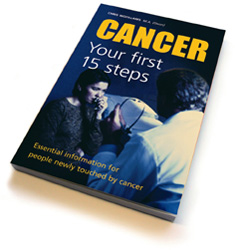 You can plan your own, all-embracing, treatment programme, with Cancer - Your first 15 Steps; (we even have a Book by the same name), or you can look for what might have caused your cancer, and what might be maintaining it and so try to cut it out of your life. Start with the 4 Pillars of Cancer.
You can plan your own, all-embracing, treatment programme, with Cancer - Your first 15 Steps; (we even have a Book by the same name), or you can look for what might have caused your cancer, and what might be maintaining it and so try to cut it out of your life. Start with the 4 Pillars of Cancer.
Then you can look up the drugs your oncologist is recommending.
You can then access a whole world of Complementary Therapies start with our kiddies’ guide to them all.
Building an Integrated Treatment Programme
At CANCERactive we believe your cancer is as individual as you are. And the way to increase your personal odds of beating cancer is to tailor an integrated or holistic treatment programme to your personal situation using the best complementary therapies around your Doctor’s orthodox offerings.
a) Complementary Therapies: In 2012 The American Cancer Society produced a report that has since been endorsed by the top cancer body in America – The National Cancer Institute. It said that since 2006 there had been an ‘explosion’ into research into complementary therapies and that there is now ‘overwhelming evidence’ that diet, weight control and exercise can increase survival and even prevent a cancer returning.
b) Diet: In Cancer Watch, our research centre, and elsewhere on this website we have covered various aspects of ‘diet’ for cancer – for example:
a. The NCI conducted research into cancer stem cells at the heart of tumours. While a bad diet encourages them to re-grow after chemotherapy treatment (at the moment no chemotherapy is known that can kill them), a good diet including certain natural compounds ‘that can be taken as supplements’ can stop that regrowth. Many of these compounds (from resveratrol to curcumin to EGCG in green tea) are covered in our book ‘The Rainbow Diet’ (Click Here).
b. There is now mounting evidence that high plasma glucose levels are linked to the development of cancer and lowered survival rates. ‘Fasting and cancer’, The Ketogenic Diet (in conjunction with Hyperbaric Oxygen)and Calorie Restriction have shown early promise in research both with and without conventional treatments of radiotherapy and chemotherapy.
c) ‘Exercise’plays an important role. There are meta-studies showing that light, daily exercise is linked to greater survival rates. This ‘exercise’ does not have to be strenuous – it can include T’ai Chi, yoga and brisk walking, for example. The important point is that 30 minutes every day is linked to improved survival.
d) ‘Stress Management Techniques’ have been linked to ‘significantly improved survival’ in a number of studies in Cancer Watch over recent years. Stress hormones like cortisol increase in cancer patients, not surprisingly. UCLA showed that diet could reduce them, fish oils can relengthen the DNA telomeres they shorten, fish oils and curcumin can reduce cellular inflammation around the body, yoga can reduce cortisol levels (Seattle Medical School) and meditation can improve survival above and beyond this ‘significantly’.
Personal counseling has been shown to aid survival further, and in clinical studiesgood palliative care beat chemotherapy in prolonging life.
While we don’t believe there is currently any single treatment (drug, vitamin, whatever) that can ‘cure’ a cancer, we do believe that already enough is known to greatly extend survival times and even prevent a cancer returning.
We created this website so that you could make better and more informed personal choices about your life and your treatment programme. You can now take the control you would like.
We created the ACTIVE8 PPROGRAMME (Click Here) so you would have a thorough checklist helping you to piece together the best possible programme, leaving no stone unturned. To make life easier for you, there is a comprehensive book of this website – a couple of days spent reading it will save you six months hard searching around the Internet. The book is called ‘Everything you need to know to help you beat cancer’ and you can CLICK HERE to read the great reviews by doctors and others. Finally, in some cases Chris Woollams will provide ‘one on one conversations to help cancer patients access the latest information to build their personal programme. For more information click here.
You might also like to go to our Living Proofs where genuine breast cancer survivors tell their own very personal survival stories.
On this web site you will find more information about more treatment options (Complementary and Alternative, not just Orthodox), and on more possible contributory factors to the development and maintenance of your cancer, than on any other UK cancer web site. This is all supported by the very latest research evidence from all over the world in our news section Cancer Watch.
We can do this because we are not hide-bound by vested interests, and so we can always put people first. We are not influenced by companies who seek to make financial gains from patients, we have no trustees working for, or sponsored directly or indirectly by such companies, our directors take no remuneration at all. This is our true independence, from which you benefit directly.
But this independence comes at a price: We can only rely on you, and people like you, to support our work. 128,603 people visited our site in July 2013, with 20 per cent of them viewing over 25 pages on average. Every month we add 20 new pages to this site. The letters and e-mails of gratitude and praise tell us we really do make a difference.
If you feel an independent voice is essential in cancer, please, please help by making a donation. Every little helps.
return to the top

The CANCERactive Difference: Intelligent Information. Independent Voice.
IMPORTANT INFORMATION
|
*Cancer (and its related illnesses) are very serious and very individual diseases. Readers must always consult directly with experts and specialists in the appropriate medical field before taking, or refraining from taking, any specific action.
This web site is intended to provide research-based information on cancer and its possible causes and therapies, so that you can make more informed decisions in consultation with those experts. Although our information comes from expert sources, and is most usually provided by Professors, scientists and Doctors, our easy-to-understand, jargon-free approach necessitates that journalists, not doctors, write the copy. For this reason, whilst the authors, management and staff of CANCERactive, icon, and Health Issues have made every effort to ensure its accuracy, we assume no responsibility for any error, any omission or any consequences of an error or omission. Readers must consult directly with their personal specialists and advisors, and we cannot be held responsible for any action, or inaction, taken by readers as a result of information contained on this web site, or in any of our publications. Any action taken or refrained from by a reader is taken entirely at the readers own instigation and, thus, own risk.
|